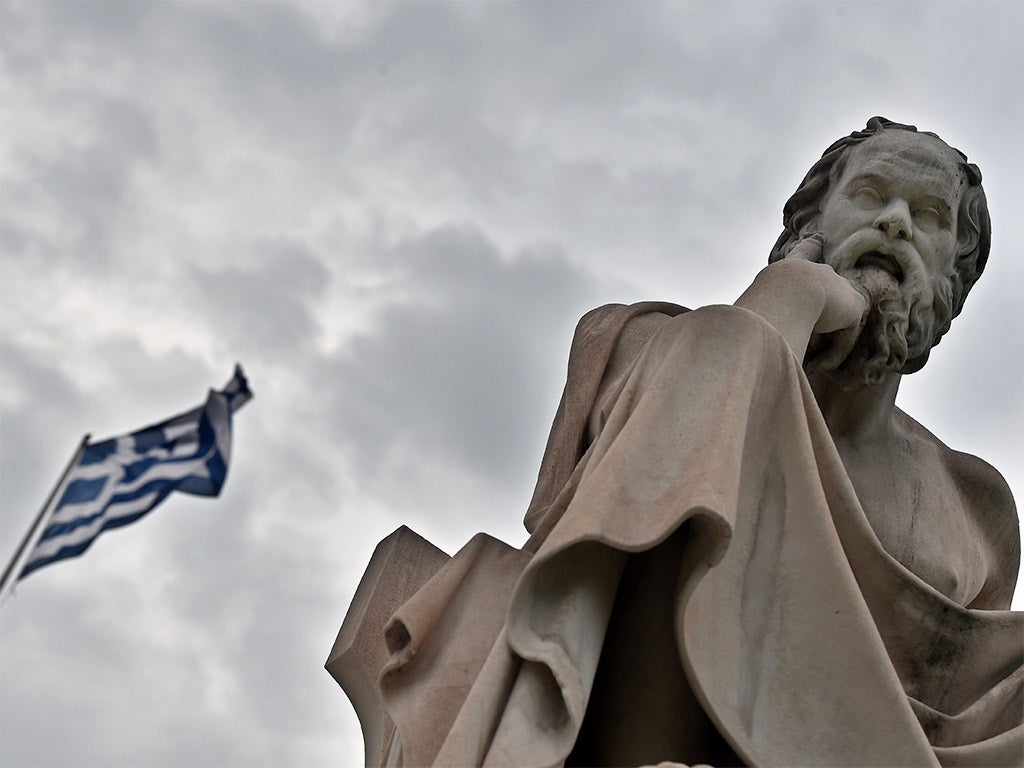9 of history's greatest philosophers reveal the secret to happiness

A well-stocked Netflix queue can go a long way toward pure and utter happiness, but sometimes there's still something missing.
For those moments, it can help to fall back on the wisdom of history's greatest thinkers: Kierkegaard, Socrates, Thoreau, and Confucius.
Here's what philosophers discovered about happiness long before orange became the new black.
Bertrand Russell
"Of all forms of caution, caution in love is perhaps the most fatal to true happiness."
It's out of character for someone like Bertrand Russell, a lover of mathematics, science, and logic, to dabble in something so negotiable as happiness.
But his idea that happiness can be found in the surrender to visceral feelings of love rings true — and contemporary science seems to be on his side.
Friedrich Nietzsche
"Happiness is the feeling that power increases - that resistance is being overcome."
For Nietzsche, the famous mustachioed nihilist, happiness is a kind of control one has over their surroundings.
The German philosopher wrote frequently on the impacts that power (and a lack of power) can have on people's lived experiences. When people resist, they take back their agency. That sense of self can then turn into happiness.
John Stuart Mill
"I have learned to seek my happiness by limiting my desires, rather than in attempting to satisfy them."
John Stuart Mill was a titan of liberalism, perhaps its most important figure in history. He spread the gospel of liberty wherever he could.
When it came to happiness, he adopted the wisdom of the ancient Greeks. Instead of inundating his life with goods, Mill believed in utilitarianism. He believed in using things for a purpose, and if they served no purpose, he banished them from his life.
Socrates
"The secret of happiness, you see, is not found in seeking more, but in developing the capacity to enjoy less."
For Socrates, one of the greatest ancient thinkers, happiness doesn't come from external rewards or accolades. It comes from the private, internal success people bestow upon themselves.
By paring down our needs, we can learn to appreciate simpler pleasures.
Confucius
"The more man meditates upon good thoughts, the better will be his world and the world at large."
Confucius' sentiment about happiness has echoed through history in books such as "The Power of Positive Thinking" and recent research in cognitive behavioral therapy, which seeks to help people see the connections between their thoughts, feelings, and behaviors.
According to a Confucian mindset, happiness is a self-fulfilling prophecy that replicates itself the more we find reasons for its existence.
Seneca
"The greatest blessings of mankind are within us and within our reach. A wise man is content with his lot, whatever it may be, without wishing for what he has not."
Beloved by contemporary philosophy nerds like the investor Nassim Taleb and marketing whiz Ryan Holiday, the Stoic philosopher firmly believed in what psychologists would now call the "locus of control."
For some people, the locus lives externally. They feel like outside forces guide their actions. For others (in Seneca's mind, the happy ones), the locus lives within.
Lao Tzu
"If you are depressed you are living in the past. If you are anxious you are living in the future. If you are at peace you are living in the present."
Translated simply as "Old Man," nobody is quite sure who Lao Tzu really was. But the figure's wisdom on living in the moment has transcended millennia.
And psychologists uphold its benefits.
Some research suggests people report the greatest happiness when they are engaged in things that require their full and present attention: good conversation, creative tasks, or sex.
Soren Kierkegaard
"Life is not a problem to be solved but a reality to be experienced."
Before there was the stellar mash-up Twitter account Kim Kierkegaardashian, there was the Danish philosopher who inspired it.
Kierkegaard was of the mind that happiness comes from being present in the moment and enjoying the ride. Once we stop turning our circumstances into problems and start thinking of them as experiences, we can derive satisfaction from them.
Henry David Thoreau
"Happiness is like a butterfly; the more you chase it, the more it will elude you, but if you turn your attention to other things, it will come and sit softly on your shoulder."
Perhaps unsurprisingly, the transcendentalist author and advocate for civil disobedience took a passive approach to happiness.
As he detailed in "Walden," Thoreau preferred to break convention. He avoided habit. Perhaps through the commitment to randomness, he thought, he could find some larger, more cosmic sense of happiness.
The idea aligns nicely with other thinkers' message to live in the moment.
• 13 things you're doing wrong from the moment you wake up
• The 10 most popular travel destinations right now
• This three-mile-high skyscraper design is coated in self-cleaning material that eats smog
Read the original article on Business Insider UK. © 2016. Follow Business Insider UK on Twitter.
Join our commenting forum
Join thought-provoking conversations, follow other Independent readers and see their replies
Comments